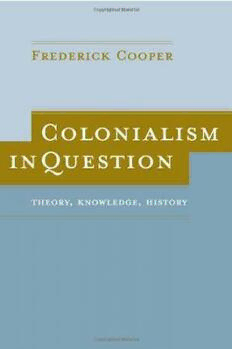
Colonialism in Question: Theory, Knowledge, History PDF
Preview Colonialism in Question: Theory, Knowledge, History
Colonialism in Question Colonialism in Question Theory,Knowledge,History frederick cooper University of California Press berkeley los angeles london University of California Press Berkeley and Los Angeles,California University of California Press,Ltd. London,England © 2005by The Regents of the University of California Library of Congress Cataloging-in-Publication Data Cooper,Frederick,1947– Colonialism in question :theory,knowledge,history / Frederick Cooper. p. cm. Includes bibliographic references and index. isbn0-520-24214-9(cloth :alk.paper) — isbn0-520-24414-1(pbk.: alk.paper) 1.Africa—Colonization—Historiography. 2.Decolonization— Africa—Historiography. 3.Imperialism—Historiography. 4.Decolo- nization—Historiography. I.Title. dt30.c5953 2005 325.6—dc22 2004021043 Manufactured in the United States of America 13 12 11 10 09 08 07 06 05 10 9 8 7 6 5 4 3 2 1 Printed on Ecobook 50containing a minimum 50% post-consumer waste,processed chlorine free.The balance contains virgin pulp,includ- ing 25% Forest Stewardship Council Certified for no old growth tree cutting,processed either tcf or ecf.The sheet is acid-free and meets the minimum requirements of ansi/niso z39.48–1992(r1997) (Perma- nence of Paper). Contents List of Illustrations vii Acknowledgments ix part i. colonial studies and interdisciplinary scholarship 1. Introduction:Colonial Questions, Historical Trajectories 3 2. The Rise,Fall,and Rise of Colonial Studies, 1951–2001 33 part ii. concepts in question 3. Identity 59 With Rogers Brubaker 4. Globalization 91 5. Modernity 113 part iii. the possibilities of history 6. States,Empires,and Political Imagination 153 7. Labor,Politics,and the End of Empire in French Africa 204 8. Conclusion:Colonialism,History,Politics 231 Notes 243 Index 313 Illustrations figures 1. “In”words and “out”words in published articles 8 2. A segmentary patrilineage 78 maps 1. Empires,c.1910 155 2. French West Africa 205 vii Acknowledgments The biggest debt I owe is to the people who appear in its notes:writers who have devoted much thought and much effort to pondering the question of colonialism in world history.The strongest compliment a scholar can pay to another is to engage her or his ideas critically,and this book has been written in such a spirit.These pages address subjects that have been given considerable attention in the past two decades,and I have had the privilege not only of following and participating in exchanges that have occurred in print, but in attending some of the conferences where colonial issues have been debated and in hearing presentations by visitors to the Univer- sity of Michigan and New York University,the two institutions at which I have taught in these decades.I can no longer trace what I learned where, but the programs at the University of Michigan in Anthropology and His- tory, Comparative Studies of Social Transformations, and Postemancipa- tion Societies have contributed greatly to bringing new perspectives to my attention,and,however critical I may be of certain arguments and concepts, the ideas expressed there have provoked a great deal of thought.The notes to this book refer to many people who at one time were colleagues at the University of Michigan,reflecting a particularly engaged academic culture in which it was my good fortune to participate for over eighteen years. Keeping to people whose work is actually cited in what follows (and risk- ing forgetting a few),I would like to acknowledge the writing and influence of Rebecca Scott, Tom Holt, Nancy Hunt, Mamadou Diouf, Bill Sewell, David Hollinger, Geoff Eley, Ron Suny, Julia Adams, Müge Göçek, Ann Stoler, Simon Gikandi, Fernando Coronil, Nick Dirks, Jane Burbank, Matthew Connelly, Juan Cole, Sue Alcock, and George Steinmetz. The stream of visitors coming to Michigan whom I had a chance to hear and meet—including Partha Chatterjee,Gyan Pandey,Gyan Prakash,and ix x / Acknowledgments Dipesh Chakrabarty—opened up what was to me,and many others,a new field of inquiry and new perspectives.A special word of thanks to Partha Chatterjee and Gyan Pandey for their hospitality when I visited Calcutta and Delhi in 1996,and to Mamadou Diouf for his generosity when we first met in Dakar in 1986and for the many exchanges we have had since then. The parts of this book (and previous publications) focused on francophone Africa benefited also from the tutelage of Mohamed Mbodj, Boubacar Barry,and Babacar Fall.The African side of the work also benefited from conversations with my Michigan colleagues,especially David Cohen. The Michigan empire—on which the sun never seems to set—can also be traced in what follows to many former graduate students on whose com- mittees I served and who have taught me a great deal as they became in- fluential contributors to a field of history in its key stage of development: Susan Thorne,Lora Wildenthal,Christopher Schmidt-Nowara,Ada Ferrer, Lisa Lindsay,Pamela Scully,Lynn Thomas,Tim Scarnecchia,Steven Pierce, Dorothy Hodgson,Aims McGuiness,Andy Ivaska,Sarah Womack,Moses Ochonu,Vukile Khumalo,and Kerry Ward among them.Since moving to NYU in 2002,I have found new intellectual homes in the History Depart- ment,the Institute of French Studies,and the Center for Middle Eastern Studies;they all have welcomed and encouraged thinking and research on colonial questions. I encountered here another set of scholars whose re- search and writing on a wide range of empires has informed and influenced the writing of this book, including Lauren Benton, Mike Gomez, Manu Goswami, Emmanuelle Saada, Harry Harootunian, Rebecca Karl, Khaled Fahmy,Antonio Feros,Tim Mitchell,Louise Young,and,as ever,Jane Bur- bank.I have particularly profited from extensive conversations on colonial questions with Manu,Emmanuelle,Antonio,and Jane.My graduate classes on empires and on decolonization at NYU have sent me back to rethink or rewrite sections of the book;I am particularly grateful for the critical read- ing that my decolonization class in the fall of 2003gave to an earlier ver- sion of the introduction.And thanks to Marc Goulding for meticulously checking notes. Ann Stoler realized that I was studying colonial questions before I did, and our collaboration in organizing an international conference,sponsored by the Wenner-Gren Foundation in 1988,and later in editing Tensions of Empire:Colonial Cultures in a Bourgeois World,has been instrumental in shaping the research trajectory that has gone into this book.During this time,Jane Burbank was telling me that my perspective on colonial ques- tions was limited by its focus on nineteenth- and twentieth-century em- pires coming out of Western Europe.The message finally got through and
